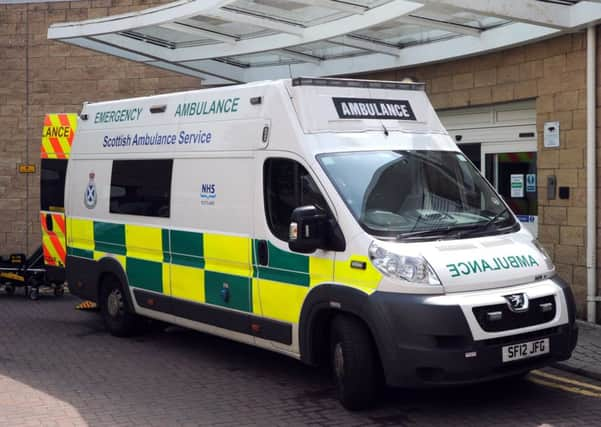Ambulance staff criticised after man left paralysed


The Scottish Public Services Ombudsman upheld a complaint that paramedics failed to ensure that David Morrison was treated for the “worst case scenario” and put on a stretcher wearing a neck brace.
The 70-year-old is now unable to walk and confined to his bed most of the time, his family said.
Advertisement
Hide AdAdvertisement
Hide AdOmbudsman Jim Martin also criticised the Scottish Ambulance Service’s (SAS) handling of the family’s concerns, ordering a review of their complaints system.
Mr Morrison’s wife, Elizabeth, complained about his care after his fall in March 2012.
He had been out with friends and had been drinking. On returning to his home in Kirkcaldy, Fife, he went upstairs to use the toilet but his wife found him struggling to breathe and unconscious at the bottom of the stairs,
An ambulance arrived promptly but Mrs Morrison said that the paramedics involved made judgemental statements about her husband after she overheard them mentioning “drunks”.
She said that their opinion of him affected the care provided to him and she complained that despite his fall, he was transferred to the ambulance by wheelchair instead of by stretcher wearing a neck brace.
Mrs Morrison alleged that the paramedics’ actions may have contributed to her husband being paralysed in both legs.
After finding him at the bottom of the stairs, Mrs Morrison and her son moved him to the living room.
Mrs Morrison, referred to in the report as Mrs C, said the ambulance crew seemed initially reluctant to take her husband to hospital and only did so because his blood pressure was low. But she then overheard them making comments about “drunks”.
‘Unprofessional’
Advertisement
Hide AdAdvertisement
Hide AdThe report said: “Mrs C was annoyed because she said these comments were completely unprofessional and their judgemental attitude affected the way they treated Mr C [Mr Morrison].
“In the meantime, Mrs C said that Mr C was transferred to a wheelchair and taken to the ambulance but that the staff concerned failed to ensure that he was treated for the ‘worst case scenario’, that is, on a stretcher wearing a neck brace.
“Mrs C said that because Mr C had been drinking alcohol, he was treated as a nuisance rather than the injured person he clearly was.”
The ombudsman’s medical adviser said guidelines stated that all patients with the possibility of spinal injury “should have manual immobilisation applied at the earliest opportunity”.
The report said: “The adviser was of the opinion that when they first arrived on the scene, the ambulance crew should have been alert to the fact that Mr C had experienced a significant fall.
“Once the mechanism of the fall had been established, coupled with the decreased level of consciousness and apparent alcohol intoxication, manual spinal immobilisation should have been applied at the earliest opportunity. It was not.”
The ombudsman upheld the complaint that the SAS failed to ensure that their staff used a stretcher and neck brace when transferring Mr Morrison to hospital.
The ombudsman also said he was concerned at the SAS response to Mrs Morrison’s written complaint to them “as this seems to be entirely inadequate and not proportionate to the seriousness of the allegation”.
Advertisement
Hide AdAdvertisement
Hide AdHe ordered the SAS to apologise to the family and to externally audit their complaints handling processes.
Mr Morrison’s son, Bryan, said the family did not want anyone else to go through what they had experienced.
“I would hate for somebody else to go through what we have been through. It has been absolutely terrible,” he said.
“My dad uses a wheelchair now but most of the time he is confined to his bed because he has so much bother with bed sores.”
He added: “My mother has never asked for any compensation. A simple apology was the main thing we wanted.
“Before this he had a very active life walking the dogs, he was always out in the garden.”
A spokesman for the Scottish Ambulance Service said: “We have apologised to the family and addressed the concerns about standards of care and will comply fully with all of the recommendations in the report.”